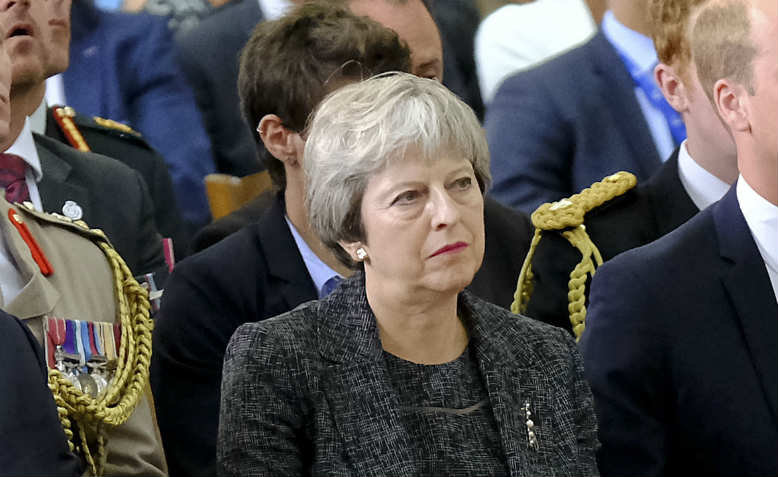 Theresa May, UK Prime Minister. Photo: Flickr/Number 10
Theresa May, UK Prime Minister. Photo: Flickr/Number 10
This government is sustained by class hatred alone. But they are weak and we must keep up the pressure for a general election
24 hours after suffering the worst Commons defeat in history over their central policy, Theresa May’s government have narrowly won a vote of no confidence. Theresa May should have resigned yesterday, it is manifestly obvious that this government has no legitimacy and is increasingly unable to pass legislation. This government have been defeated over 30 times in the House of Commons – an incredibly high figure which would be even higher without their manoeuvrings to ensure that unpopular and vicious policies, such as the expansion of Universal Credit, would not have to go to a vote.
By calling the vote of no confidence Jeremy Corbyn exposed what is keeping this government in place: class hatred and fear. The Conservative MPs and the DUP who voted against May’s deal on Tuesday were by Wednesday professing their confidence in the government because they are terrified by Corbyn’s popularity and cannot stand the idea of that being expressed in a general election.
Michael Gove, in a raving, hate-filled speech in the House of Commons, bluntly promised he would “never allow that man to be Prime Minister of this country”. It is a measure of ruling class arrogance that Michael Gove assumes it is the role of discredited and widely hated Tory politicians to decide who should and should not be Prime Minister.
Gove’s defence of the Prime Minister bore little resemblance to reality. 2019 has begun with announcements of yet more high street stores closing as well as significant job losses at Jaguar Land Rover. Yet Gove praised the “inspirational” Prime Minister for all the jobs she has apparently created as well as lauding her commitment to public services and social justice (listening to this on the radio it was impossible to know whether he managed to keep a straight face).
In a speech full of disgusting smears about Jeremy Corbyn, Gove revealed his own worst fears. Proclaiming himself a great supporter of Israel, he then went on to denounce Corbyn’s opposition to NATO, to nuclear weapons, to bombing Syria (rebranded by Gove as fighting “fascism”) – culminating, rather bizarrely, in his claim that Corbyn would not “stand up” to Spain over Gibraltar. In short, the Tories are terrified that, as Prime Minister, Corbyn would stand up to British imperialism.
The vote in the Commons on Wednesday night was not an expression of support for a government that has all but ceased to operate – it was an expression of right-wing unity against Jeremy Corbyn and the desire for change that he represents. For all the noisy rhetoric it demonstrated that there is something bigger than Brexit at stake here, as Leave and Remain Conservative and DUP MPs united to try and stop any chance of a progressive government. With only 19 votes in it, it was hardly a resounding success.
It is vitally important that the government’s attempt to circumvent democracy is exposed and met with the strongest possible resistance. Jeremy Corbyn’s reputed plan to repeatedly call votes of no confidence can draw attention to the government’s illegitimacy and keep the pressure up. However, breaking the Conservative death-grip on government will require more than pressure in parliament. It will require mobilising masses of people whose voices the government are trying to stifle. Some important steps have been taken: the general secretaries of four trade unions (Unite, UNISON, CWU and TSSA) have called for a general election; the People’s Assembly Against Austerity have called for actions around the country on Saturday.
It is crucial that we do not become demoralised by, or afford any legitimacy to, a dodgy parliamentary stitch-up. There is pressure to do just that from those forces calling for a second referendum. A number of MPs are claiming that Wednesday’s vote in the Commons means that there is now not going to be a general election as a way of trying to win support for a second referendum by default. That’s hardly a robust defence of democracy. Instead, it is a calculated, opportunistic move which aims at overturning the referendum result.
To support a second referendum on that basis is obviously undemocratic and would alienate huge numbers of people, not least a substantial portion of Labour voters. Moreover, there is considerable evidence to suggest this would be unsuccessful even if is judged in narrow parliamentary terms. 71 Labour MPs wrote to Corbyn today urging him to support a second referendum – far from being anywhere near a majority of the Parliamentary Labour Party. A second referendum does not have much chance of success in Parliament in its current composition. It is not clear what would be on the ballot paper: surely not Theresa May’s discredited deal; no deal versus remain would be an expression of parliamentary ineptitude in the face of the EU; 3 options would be unlikely to provide a decisive result. Then there’s the problem of the result itself. There’s no guarantee what it would be or that it would be accepted.
Instead, the second referendum strategy threatens to undermine Corbyn. It denies the opportunity for an election and thus throws a lifeline to an illegitimate government at a moment when they are incredibly weak. To do that for a government that are instituting the most sustained and vicious attack on working-class people since the 1980s is unforgivable. A general election, as the Conservatives well understand, would be about far more than Brexit – and that’s why we have to fight for it.

